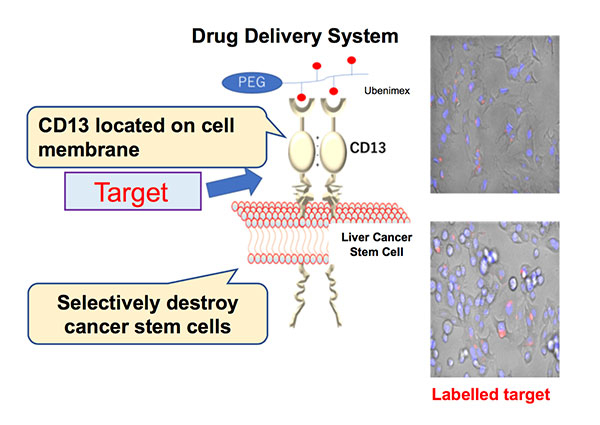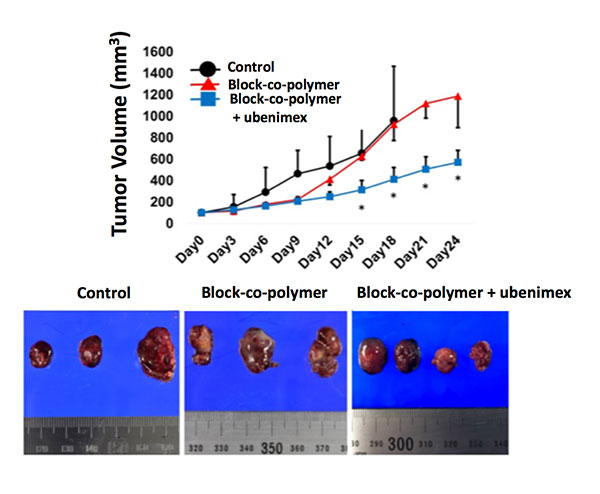A joint group of researchers from Osaka University and Tokyo Tech created a drug delivery system (DDS) using a poly (ethylene glycol)–poly(lysine) block copolymer–ubenimex conjugate (PEG-b-PLys(Ube)). The use of this DDS has enabled an increase in the concentration of ubenimex in target CSCs. In addition, combined use of standard anticancer drugs significantly decreased CSCs.

Figure 1. Outline of the drug delivery system (DDS) created in this study
©Osaka University
Cancer tissue cells are divided into two major groups: cancer cells and cancer stem cells (CSCs). CSCs are related to cancer progression and dissemination, so it's necessary to eradicate CSCs in order to cure cancer. However, because CSCs are resistant to chemotherapy and radiotherapy, cancer is refractory.
A research group from Osaka University, in collaboration with Tokyo Institute of Technology, had found that there were CD13 surface markers in hepatocellular carcinoma (HCC) stem cells. When CD13 inhibitor ubenimex is added to CSCs, HCC stem cells cause apoptosis (programmed cell death), becoming extinct. However, because CSCs only reside in part of tumor tissues, it's imperative to develop a method for delivering drugs in high concentration to target sites.
The researchers created a drug delivery system (DDS) using a poly(ethylene glycol)–poly(lysine) block copolymer–ubenimex conjugate (PEG-b-PLys(Ube)). The use of this DDS has enabled an increase in the concentration of ubenimex in target CSCs. In addition, combined use of standard anticancer drugs significantly decreased CSCs. (Figure 1) Their research results were published in Oncogene.
Lead author Masamitsu Konno says, "First, we developed a DDS to deliver highly concentrated ubenimex and then, another DDS in which 20 ubenimex molecules were bound with poly (ethylene glycol)–poly(lysine) block copolymer conjugates."
Using this method, they performed intraperitoneal administration and intravenous injection of ubenimex in mice, finding that the tumor size was significantly reduced. (Figure 2) This shows that it has become possible to deliver ubenimex to CSCs in high concentration.

Figure 2. Antitumor effects
Comparative testing: saline solution (control), block copolymer only, block copolymer and ubenimex are administered to mice with hepatic cancer. Days after drug administration and tumor growth in hepatic cancer mice show that hepatic cancer cells significantly reduce in mice that received block copolymer and ubenimex.
©Osaka University
Next, the combined administration of ubenimex and existing anticancer drugs (luorouracil (5-FU), cisplatin (CDDP), and doxorubicin (DXR)) was performed, enhancing apoptosis in vitro synergistically in CSCs in mice.
Corresponding author Hideshi Ishii says, "Our research results will promote the application of drugs whose medical effects on CSCs were verified but there were challenges in their delivery to target sites, which will promote repositioning, i.e., the drugs will be used to treat different diseases. Block copolymers used in the DDS in this study can be easily produced and exhibit strong effects, allowing them to be used for the application of other drugs as well."
Reference
Authors : |
Reishi Toshiyama, Masamitsu Konno, Hidetoshi Eguchi, Hiroyasu Takemoto, Takehiro Noda, Ayumu Asai, Jun Koseki, Naotsugu Haraguchi, Yuji Ueda, Katsunori Matsushita, Kei Asukai, Tomofumi Ohashi, Yoshifumi Iwagami, Daisaku Yamada, Daisuke Sakai, Tadafumi Asaoka, Toshihiro Kudo, Koichi Kawamoto, Kunihito Gotoh, Shogo Kobayashi, Taroh Satoh, Yuichiro Doki, Nobuhiro Nishiyama, Masaki Mori, Hideshi Ishii |
Title of original paper : |
Poly(ethylene glycol)–poly(lysine) block copolymer–ubenimex conjugate targets aminopeptidase N and exerts an antitumor effect in hepatocellular carcinoma stem cells |
Journal : |
Oncogene |
DOI : |
|
Affiliations : |
Departments of Gastroenterological Surgery, Graduate School of Medicine, Osaka University
Departments of Frontier Science for Cancer and Chemotherapy, Graduate School of Medicine, Osaka University
Departments of Medical Data Science, Graduate School of Medicine, Osaka University
Laboratory for Chemistry and Life Science, Institute of Innovative Research, Tokyo Institute of Technology
|
. Any information published on this site will be valid in relation to Science Tokyo.




